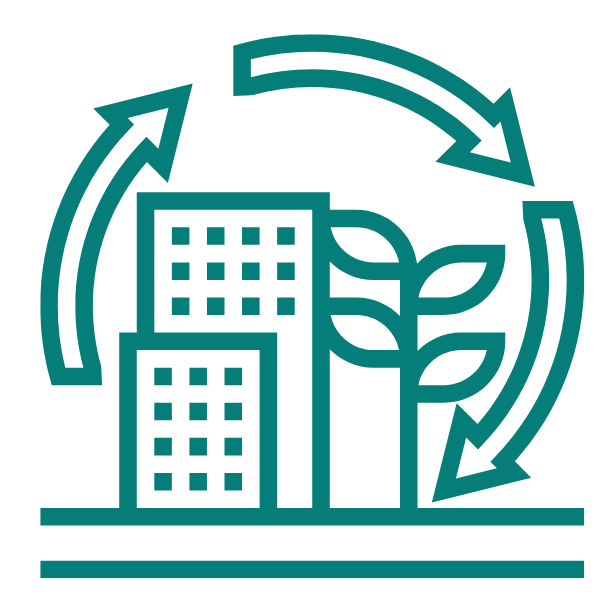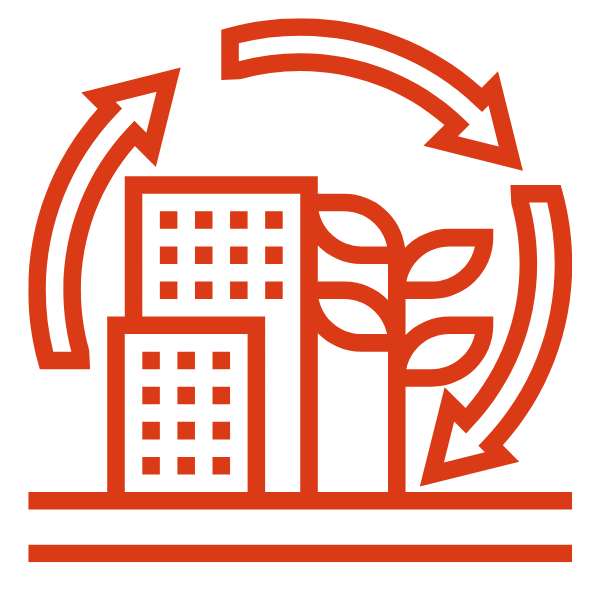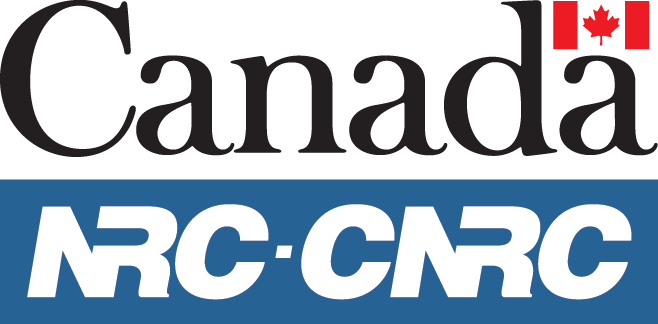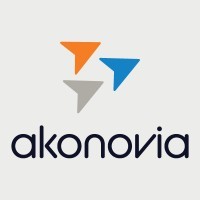Digital Twins for Smart Decarbonization of the Built Environment Meeting Circular Economy Criteria
Project overview
This research is aligned with Canada's commitment to reduce CO2 emissions by 40 to 45 per cent by 2030 and attain net-zero by 2050. Given that buildings contribute 18 per cent to these emissions, the focus on retrofitting is crucial. With 16 million homes and 482,000 buildings in need of upgrades, the challenge is substantial, requiring $20-$32 billion annually.
The complexity of this process demands efficient decision-making tools, and digital twins—virtual replicas aiding retrofit projects—offer a promising solution. However, unique standards are needed to maximize their potential.
This research program aims to enhance digital twins, specifically focusing on post-demolition waste management. The goal is to create standards and tools for digital twins, aiding retrofit design, deconstruction and whole-life analysis.
The program at this phase has two main research objectives. First, developing methods and standards to create digital twins for building retrofit; and second, evaluating retrofit alternatives based on material and components’ second life and beyond.
Key project details
| Principal investigator | Mazdak Nik-Bakht, associate professor, Building, Civil, and Environmental Engineering, Concordia University |
Co-principal investigators |
Jenn McArthur, associate professor, Mechanical Engineering, Toronto Metropolitan University; Hua Ge, professor, Building, Civil, and Environmental Engineering, Concordia University; Annie Levasseur, professor, École de technologie supérieure; Ammin Hammad, professor, Concordia Institute for Information Systems Engineering, Concordia University; Jong Won Ma, assistant professor, Building, Civil, and Environmental Engineering, Concordia University; Farzad Jalaei, research officer, National Research Council Canada |
Research collaborators |
Mohamed Ouf, assistant professor, Building, Civil, and Environmental Engineering, Concordia University; Ursula Eicker, Canada Excellence Research Chair in Smart, Sustainable and Resilient Communities and Cities and director of the Next-Generation Cities Institute, Concordia University; Tamer El-Diraby, Civil & Mineral Engineering, University of Toronto; Érik Poirier, Construction Engineering, École de technologie supérieure; Osama Moselhi, professor, Building, Civil, and Environmental Engineering, Concordia University; Yann-Gaël Guéhéneuc, Computer Science and Software Engineering, Concordia University; Jun Yan, associate professor, Concordia University; Joonhee Lee, associate professor, Building, Civil, and Environmental Engineering, Concordia University |
| Non-academic partners | Akanovia, Lighthouse, Adaptis, National Research Council |
| Research Keywords | digital twins, building retrofit, artificial intelligence, circular economy, construction and renovation waste, building information modeling, urban information modeling, decision support system |
| Budget | Cash: $395,000 In-Kind: $294,000 |
Publications:
M. Dunson-Todd, M. Nik-Bakht, and A. Hammad, “Proposed Standard Test to Evaluate Back-Support Exoskeleton Efficacy for Rebar Workers: Test Design and Initial Implementation,” J. Comput. Civ. Eng., vol. 39, no. 5, p. 04025071, Sep. 2025, doi: 10.1061/JCCEE5.CPENG-6481.
A. S. Allam and M. Nik-Bakht, “Integrating industry foundation classes and knowledge graphs for automated deconstruction planning,” Journal of Building Engineering, vol. 106, p. 112564, Jul. 2025, doi: 10.1016/j.jobe.2025.112564.
M. Babadi Soultanzadeh, M. Nik-Bakht, M. M. Ouf, P. Paquette, and S. Lupien, “Unsupervised automated fault detection and diagnosis for light commercial buildings’ HVAC systems,” Building and Environment, vol. 267, p. 112312, Jan. 2025, doi: 10.1016/j.buildenv.2024.112312.
F. Zarei, M. Nik-Bakht, J. Lee, and F. Zarei, “Urban-Scale Acoustic Comfort Map: Fusion of Social Inputs, Noise Levels, and Citizen Comfort in Open GIS,” Processes, vol. 12, no. 12, p. 2864, Dec. 2024, doi: 10.3390/pr12122864.
A. J. Martinez Lagunas and M. Nik-Bakht, “Process Mining, Modeling, and Management in Construction: A Critical Review of Three Decades of Research Coupled with a Current Industry Perspective,” J. Constr. Eng. Manage., vol. 150, no. 11, p. 04024158, Nov. 2024, doi: 10.1061/JCEMD4.COENG-14727.
M. Babadi Soultanzadeh, M. M. Ouf, M. Nik-Bakht, P. Paquette, and S. Lupien, “Fault detection and diagnosis in light commercial buildings’ HVAC systems: A comprehensive framework, application, and performance evaluation,” Energy and Buildings, vol. 316, p. 114341, Aug. 2024, doi: 10.1016/j.enbuild.2024.114341.
F. Zarei and M. Nik-Bakht, “Extending CityGML with public input – social ADE,” BEPAM, vol. 14, no. 4, pp. 547–561, Jul. 2024, doi: 10.1108/BEPAM-09-2023-0163.
R. Orenga Panizza and M. Nik-Bakht, “Building stock as a future supply of second-use material – A review of urban mining methods,” Waste Management Bulletin, vol. 2, no. 2, pp. 19–31, Jun. 2024, doi: 10.1016/j.wmb.2024.03.001.
A. Hosseini Gourabpasi and M. Nik-Bakht, “BIM-based automated fault detection and diagnostics of HVAC systems in commercial buildings,” Journal of Building Engineering, vol. 87, p. 109022, Jun. 2024, doi: 10.1016/j.jobe.2024.109022.
M. Khazen, M. Nik-Bakht, and O. Moselhi, “Monitoring workers on indoor construction sites using data fusion of real-time worker’s location, body orientation, and productivity state,” Automation in Construction, vol. 160, p. 105327, Apr. 2024, doi: 10.1016/j.autcon.2024.105327.
Accepted publications in national and international conferences:
M. Nik-Bakht, “Business models of digital marketplaces for enabling circularity in construction,” Jul. 2025.
M. Nik-Bakht, “A SWOT analysis for utilizing second-use wood as a resource for engineered wood products,” Jul. 2025.
A. Allam and M. Nik-Bakht, “Knowledge Graph-based Deconstruction Planning of Buildings Products,” presented at the 41st International Symposium on Automation and Robotics in Construction, Lille, France, Jun. 2024. doi: 10.22260/ISARC2024/0132.
Research focus

Digital twins
In this project, digital twins are crucial. The research aims to develop a plan for creating models and applying them, as well as analyzing the needs for standardizing retrofit digital twins. Digital Twins for Smart Decarbonization will create a Digital Building Products Passport (BPP) and generate urban-scale digital twins using a combination of Building Information Modeling (BIM) and Geographic Information System (GIS). The creation and evaluation of retrofit alternatives will be automated using these digital twins. Additionally, the research will incorporate whole-life assessment by considering Life Cycle Costs (LCC) and Life Cycle Assessment (LCA) within the digital twin framework.

Waste management
Additionally, urban-scale digital models are needed to consider retrofit's socioeconomic impact and Construction Renovation and Demolition (CRD) waste tracking. This program aims to reach a comprehensive assessment of retrofit options, focusing on post-demolition CRD waste management. This aspect of the research holds significance due to the considerable volume of solid waste per capita in Canada, with CRD waste ranging between 12 per cent and 25 per cent of the overall solid waste generated.
Non-academic partners
Thank you to our non-academic partners for your support and trust.




Volt-Age is funded by a $123-million grant from the Canada First Research Excellence Fund.


